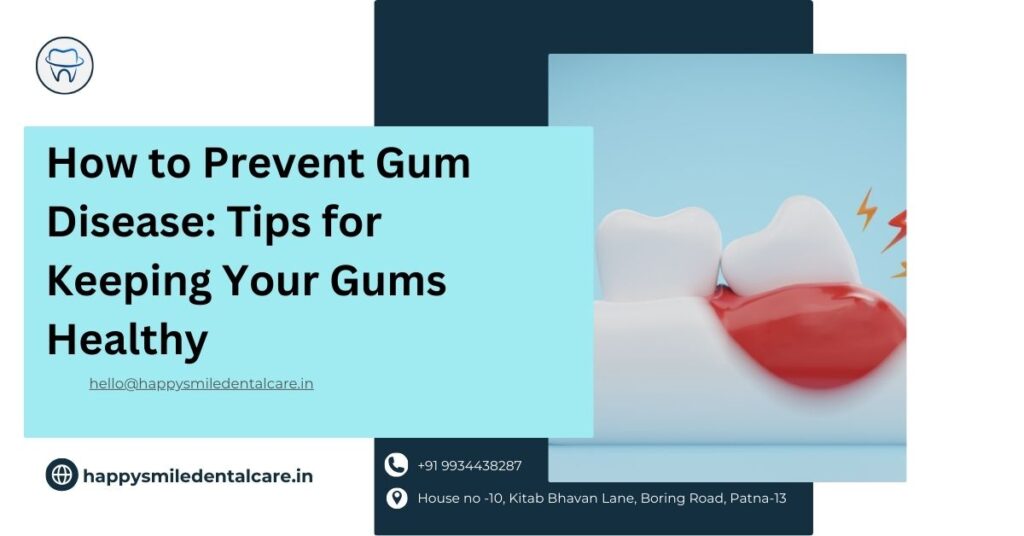Did you know nearly half of adults over 30 have some form of gum disease? According to the CDC, gum disease, also known as periodontal disease, is one of the most common oral health issues worldwide. It not only affects your gums but could have serious implications on your overall health.
The good news? Gum disease is largely preventable with the right knowledge and habits. This guide will walk you through understanding gum disease, identifying its symptoms, and adopting effective oral hygiene practices to keep your gums healthy and your smile bright.
Understanding Gum Disease
What Is Gum Disease?
Gum disease is an infection of the tissues that surround and support your teeth. It usually begins with gingivitis, the mildest form which causes redness and inflammation of the gums. Left untreated, it can progress to periodontitis, a more severe stage that can lead to gum recession, bone damage, and even tooth loss.
Key Facts About Gum Disease
- Nearly 47% of adults over 30 in the U.S. have some form of gum disease.
- Advanced gum disease is the leading cause of adult tooth loss.
- It is often a “silent” disease, meaning many people don’t realize they have it until it progresses.
- Smoking is one of the most significant risk factors for gum disease.
- Poor oral hygiene and lack of regular dental check-ups contribute to its development.
- Gum disease has been linked to other health conditions such as heart disease and diabetes.
- Early symptoms include swollen, red, or bleeding gums, which are often overlooked.
- Proper brushing, flossing, and professional cleanings can help prevent gum disease. Effective oral hygiene practices.
Causes of Gum Disease
- Poor oral hygiene is the primary cause of gum disease. Plaque buildup allows harmful bacteria to thrive.
- Tobacco use significantly increases the risk, as smoking weakens your gum tissues.
- Hormonal changes, such as during pregnancy or menopause, make gums more sensitive and prone to infections.
- Medical conditions like diabetes and heart disease can exacerbate gum-related issues.
Signs and Symptoms of Gum Disease
Identifying gum disease early is key to preventing it from worsening. Symptoms to watch for include:
- Swollen, tender, or bleeding gums, especially after brushing or flossing.
- Persistent bad breath or a bad taste in the mouth.
- Receding gums, making teeth look longer than usual.
- Loose or shifting teeth.
If you’re experiencing any of these signs, it’s important to schedule an appointment with your dentist as soon as possible.
Tips for Preventing Gum Disease
1. Maintain Good Oral Hygiene
- Brush twice daily using fluoride toothpaste, making sure to clean along the gumline.
- Floss daily to remove plaque and food particles from areas your toothbrush can’t reach.
- Consider upgrading to an electric toothbrush for more effective plaque removal.
- Rinse with mouthwash to kill bacteria and freshen breath.
- Replace your toothbrush or toothbrush head every 3 months or sooner if the bristles are frayed.
- Visit your dentist regularly for check-ups and professional cleanings.
- Avoid consuming too much sugary or acidic food and drinks, which can damage your teeth over time.
- Stay hydrated by drinking plenty of water, which helps wash away food particles and bacteria.
2. Regular Dental Checkups
Attending routine dental visits is crucial for early detection and prevention:
- Visit your dentist at least twice a year for professional cleanings and preventive exams.
- Dental professionals can remove tartar and plaque buildup, which regular brushing can’t tackle.
- Early detection of cavities, gum disease, or oral health issues can save you time, money, and discomfort later.
- Routine checkups help monitor overall oral health, including signs of oral cancer or other underlying conditions.
- Professional advice on maintaining proper dental hygiene and personalized care tips can improve your daily routine.
- Regular visits help keep your teeth and gums healthy, preventing bad breath and ensuring a confident smile.
3. Choose a Healthy Diet
Diet plays an essential role in gum health:
- Eat nutrient-rich foods like leafy greens, carrots, apples, and whole grains. These strengthen gums and teeth.
- Include calcium-rich foods like dairy products, almonds, and tofu to maintain strong teeth and bones.
- Consume vitamin C-rich foods such as oranges, strawberries, and bell peppers to support healthy gums.
- Stay hydrated by drinking plenty of water, which helps wash away food particles and bacteria.
- Avoid excessive consumption of sugary snacks and beverages, which can fuel harmful bacteria.
- Limit acidic foods and drinks like citrus fruits and sodas, as they can erode enamel over time.
4. Quit Smoking
- Smoking is a major risk factor for gum disease, impairing your gums’ ability to heal properly.
- It also increases the risk of oral cancer and stains your teeth, affecting your overall oral health and appearance.
- Quitting smoking improves blood flow to your gums, helping them heal and stay healthy.
- Reach out to your healthcare provider for resources or programs to quit smoking. Your gums will thank you!
- Consider nicotine replacement therapies or support groups to make the quitting process easier and more effective.
- Regular dental checkups can help monitor your gum health as you quit smoking.
5. Stay Hydrated
Drinking plenty of water is a simple yet impactful step in oral care:
- Hydration encourages saliva production, which helps wash away food particles and bacteria.
- Water rinses your mouth, keeping acids and plaque under control.
- Staying hydrated prevents dry mouth, which can lead to bad breath and tooth decay.
- Drinking water after meals helps neutralize acids from foods and beverages.
- Proper hydration supports overall health, which contributes to healthier teeth and gums.
6. Use Antimicrobial Mouthwash
Rinse daily with a mouthwash that fights plaque and bacteria:
- Look for antimicrobial or fluoride-based products for added protection.
- This step reaches areas your toothbrush and floss might miss, providing an extra layer of care.
- Helps reduce plaque buildup and prevent gum disease over time.
- Freshens breath by eliminating odor-causing bacteria.
- Ideal for maintaining oral health between dentist visits.
7. Manage Stress
Stress can impact your oral health:
- Prolonged stress weakens your immune system, increasing susceptibility to gum infections.
- Incorporate activities such as exercise, yoga, or meditation to reduce stress levels.
- Practice deep breathing techniques to calm your mind and body.
- Take regular breaks throughout the day to avoid burnout.
- Maintain a healthy sleep routine to support overall well-being.
- Engage in hobbies or activities that bring you joy and relaxation.
- Stay connected with friends and family for emotional support.
How to Maintain Healthy Gums
Even with preventive care, consistency is key to maintaining long-term gum health. Here are additional tips to ensure your gums remain strong and healthy:
- Invest in a soft-bristled toothbrush to avoid damaging gum tissues and enamel.
- Try gum massage by rubbing your gums gently with your finger or a toothbrush to promote blood flow.
- Chew sugarless gum to stimulate saliva, which helps combat dry mouth—a condition that can contribute to gum disease.
- Floss daily to remove plaque and food particles from between your teeth and along the gumline.
- Use an antibacterial mouthwash to reduce bacteria and prevent gum infections.
- Visit your dentist regularly for professional cleanings and check-ups to catch and treat any issues early.
- Maintain a healthy diet rich in vitamins C and D to strengthen your gums and immune system.
- Avoid smoking, as it significantly increases the risk of gum disease.
When to See a Dentist
Certain symptoms warrant immediate professional attention. Reach out to your dentist if you notice:
- Persistent gum pain or swelling.
- Gums that bleed excessively, even with gentle brushing.
- Chronic bad breath that doesn’t improve after oral care.
- Loose teeth or significant gum recession.
A dentist can assess your condition, provide deep cleanings if needed, and recommend personalized treatments to restore gum health.
Your Gums Deserve the Best Care
Healthy gums are the foundation of a confident smile and overall well-being. By incorporating these preventive measures—like regular brushing, flossing, eating a balanced diet, and quitting smoking—you can significantly reduce your risk of gum disease.
Don’t hesitate to take the next step for your gum health by scheduling regular dental checkups with Happy Smile Dental Care, where our experts are here to guide you every step of the way. Together, we’ll keep your gums healthy and your smile dazzling!
Conclusion
Taking care of your gums is essential for maintaining a healthy, beautiful smile and overall wellness. By staying proactive with your oral health and seeking professional care when needed, you can protect your gums from disease and prevent complications down the road. Remember, a small investment in your gum health today can make a world of difference for your future. Trust Happy Smile Dental Care to support you on your path to a lifetime of confident and healthy smiles!

